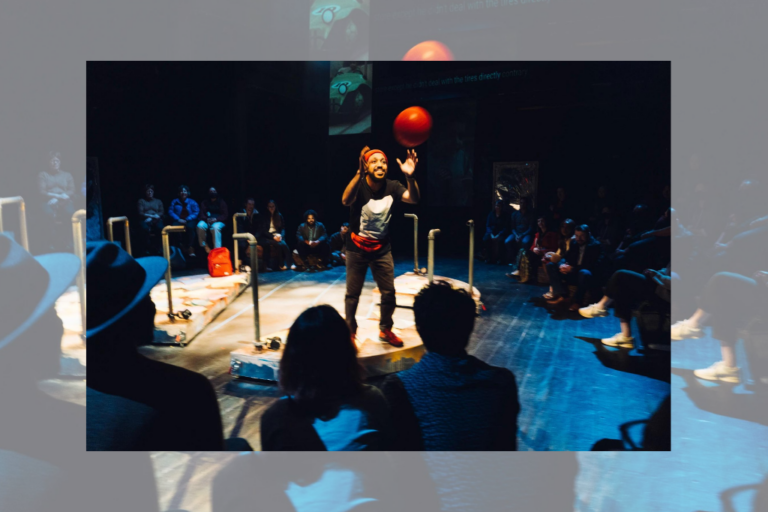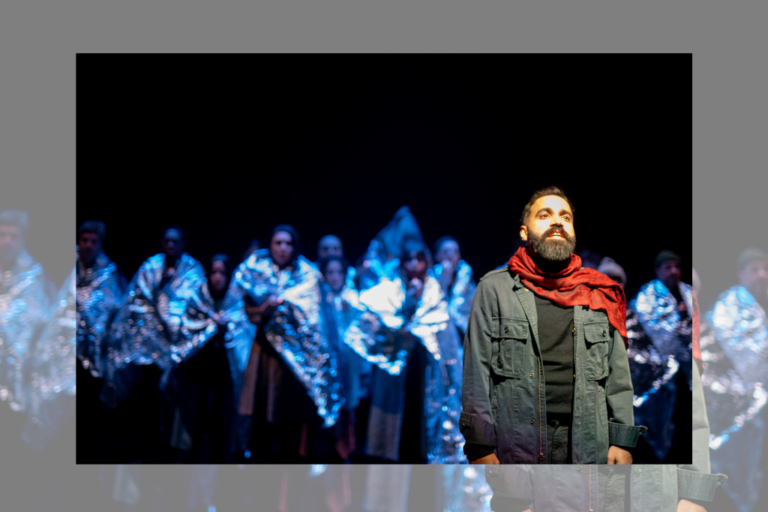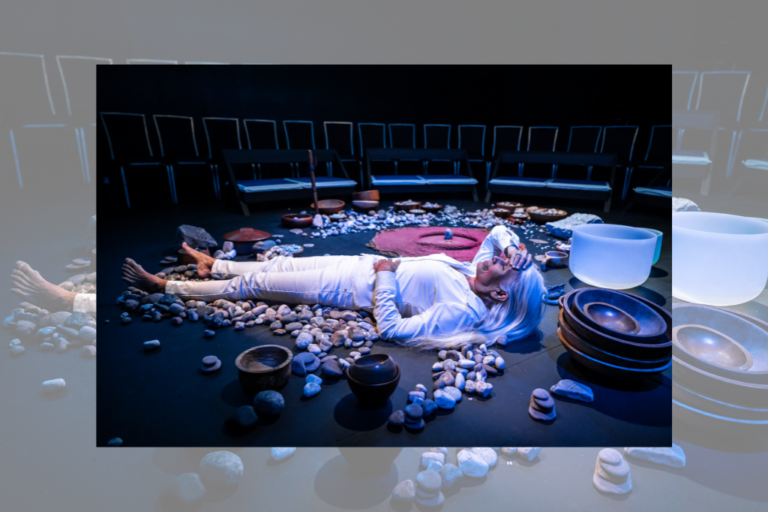REVIEW: The Wrong Bashir is an ode to the hyphenated identities of Canada
It’s Crow’s Theatre’s final production of the 2023-24 season, and we’re in the classic split-level Toronto home of an Ismaili Muslim family. Tucked away from the frenzy of Toronto’s streets on a busy spring evening, Ken Mackenzie’s set for playwright Zahida Rahemtulla’s The Wrong Bashir is a welcoming, homey abode. That is, to anyone that isn’t young Bashir Ladha (Sharjil Rasool).
As a student studying philosophy at Toronto Metropolitan University, Bashir has better places to be, philosophize about, and do than sit still on his family’s couch or even pick up pills for his grandfather (Salim Rahemtulla), who has advancing Alzheimer’s (editor’s note: we’ve removed the phrase “Ismaili-Canadian” to describe Bashir from this article, following Jamal Virani’s reader comment below, for which we offer thanks). Bashir’s routine is all about recording the next episode of his podcast, “The Smiling Nihilist,” a recognizable iteration within the oversaturated podcast market of 20-somethings who speak softly into the microphone about nihilism, existentialism, and death’s place in between.
When he’s not recording, Bashir is busy visiting cafes that might play his podcast recordings. This is also why he is noticeably missing in the beginning of the show, while his father Sultan (Sugith Varughese), mother Najma (Nimet Kanji), and younger sister Nafisa (Bren Eastcott) bemoan his absence.
To Sultan and Najma — with their anachronistic perceptions of Queen Street and the hippies who reek of weed — Bashir’s growing distance from the family’s religious traditions and language is a persistent concern. So, when they receive a phone call telling them that the Ismaili council has appointed their son as a student mukhi, or youth religious leader, their mission to have Bashir accept the position abruptly begins — with the emphasis that historically no one has ever turned down the appointed role.
When two members of the council — Al Nashir (Vijay Mehta) and Mansour (Parm Soor) — pay a visit to the family’s house for the selection process, it becomes gradually clear to everyone that they have the wrong Bashir.
The remainder of the two hour-long play pans out in a fairly predictable, but no less funny plotline of a typical mistaken identity comedy, in which the exceedingly courteous Al Nashir and the gleefully oblivious Mansour fiercely devise plans to escape while the family pours out food and chai in a house cleaned to impress. Bashir’s grandparents (Rahemtulla and Zaittun Esmail), who were invited over upon the news of Bashir’s appointment, add a different challenge to the two councilmembers’ quest to escape. All the while, Bashir bickers with his pragmatic sister, who unwaveringly encourages his path to becoming a mukhi.
As in many comedies, there are points of exaggeration. Gulzar (Pamela Mala Sinha), the gossipy family friend, elicited chuckles from the audience on opening night, but her lines were indecipherable at times, often delivered in what seemed to be a higher-than-necessary pitch. Sultan’s booming anger at his son for meandering in philosophical thought all day is so frequent, too, that it sometimes loses the paternal sincerity within. And Najma’s hyperbolic concerns and miming of her son smoking pot with monks were never really funny to me.
But, again, this is a recurring experience of mine with comedy as a Gen Z student and theatregoer. Although the main character in a given show may be my age, the humour is seldom relatable. Many of the comedic points of dialogue appear to be pointedly geared towards millennials and older generations. During plays, I often feel myself questioning if I am laughing voluntarily or with the herd. At The Wrong Bashir’s opening night performance, it was mostly the latter.
Unrelatable comedy notwithstanding, I related to Bashir as a person — significantly more than I ever have with the Korean characters of Kim’s Convenience, a comparison to The Wrong Bashir that the Crow’s notes in its marketing materials for the show. There’s a nuanced approach to the difference between Bashir’s perception of himself and him as he is.
Despite their appearance of being even, hyphenated identities like Bashir’s, or my friends’ Korean-Canadian selves, can become scaled identities over time, where one outweighs the other. (And it’s usually the former that weighs lighter.)
Bashir lets out exasperated sighs and rolls his eyes whenever Mansour mistakes his podcast name, “The Smiling Nihilist,” for “The Ismaili Nihilist.” Although for comedic relief, the frustration Bashir exerts is complicated, as it’s a clashing moment between his idea of himself and who he actually is. He is no less Ismaili than he is Canadian or “smiling.” So why must that make him so agitated?
These are all steps in Bashir’s journey of coming to (maybe) fully embrace his identity — before and after the hyphen. Quibbles on the comedic quality of the show aside, The Wrong Bashir will stay with me for a while because Rahemtulla’s debut script is a successful ode to hyphenated identities across Canada.
The Wrong Bashir runs at Crow’s Theatre until June 16. Tickets are available here.
Intermission reviews are independent and unrelated to Intermission’s partnered content. Learn more about Intermission’s partnership model here.












Shia Ismaili Islam is a faith and not a nationality nor an ethnocultural group – so I just wanted to point out that we’re referred to as Canadian Ismailis and not Ismaili-Canadian. Similar to how saying “Christian-Canadian” just simply doesn’t make sense.
As much as it’s important for us to recognize all of our cherished identities, it’s a core tenant of Ismailism to recognize we are all members of a global Ismaili Jamat (community) – we fundamentally believe we’re 100% Ismaili (unable to be lightened by a hyphen) and are only separated by geographical boundaries.
In the same way, those of us here are also 100% Canadian by nationality – also fundamental to our self-concept – and as our leader His Highness the Aga Khan told us Canadian Ismailis in the 1970s: “make Canada your home.”
Loved this article!
Hi Jamal! Thank you for this thoughtful feedback on my review. My emphasis on the balancing of Bashir’s identity stemmed from his constant struggle with finding his place within his family’s beliefs and identity. I resonated a great deal with Bashir’s visceral reactions to his podcast being “misheard” as the Ismaili Nihilist, while he is Ismaili and Canadian — thus resulting in my comparisons of hyphenated and weighed identities at the end of the review. I nevertheless understand your point of feedback and thank you again!